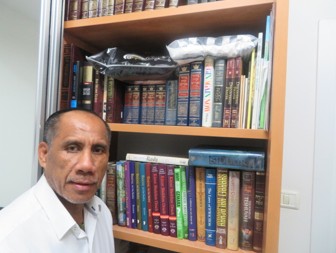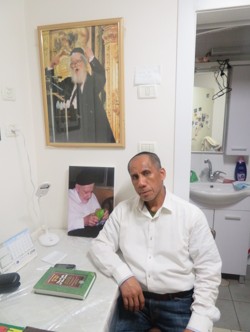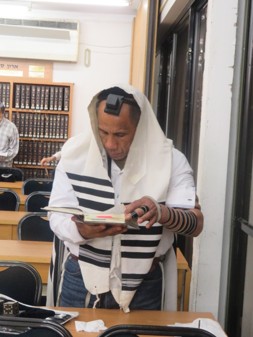The Filipino Convert: "I Decided to Fast on Yom Kippur, Even Though I'm Not Jewish Yet"
Emanuel Mamita from the Philippines came to Israel for work, but he soon discovered Judaism and became interested. After years of being exposed to the Jewish world, he decided to convert. "I believe the Torah was given to me too, we all have one God."

Emanuel Mamita (57) looked like a typical Filipino worker who found a black hat, using it as a sun hat, but when I noticed him entering the synagogue on his own, not pushing an elderly person in a wheelchair or assisting someone handicapped, I realized there was a story here.
It was Friday night, and I decided to approach him: "Good evening, my name is Eric, and my power is out at home. We need a 'Shabbat goy,' is there a chance you'd be willing to help us?" I asked the Filipino man across from me.
"I don't turn on lights on Shabbat; I'm a Shabbat-observant Jew," replied the Filipino with a half-smile, maybe half-annoyed.
It sounded more than interesting. I asked if we could meet and we agreed to talk during the week after the morning prayer in the neighborhood synagogue. So we did. We sat in the synagogue, I and Emanuel, the Filipino. I noticed that he was the first to arrive for prayer, about 20 minutes early. He seemed like a small custodian, responsible for opening the doors, turning on the air conditioning, and the lights.
"I was born as Amdo-Emilio Mamita, in one of the villages in the Philippines," he began his story. "I grew up Christian and studied the New Testament, attracted to history and roots, but there was always something bitter in this teaching, and I didn’t know what."
What did you do with that feeling?
"I did nothing, I continued my life routine, like 100 million other Filipinos, I got married and worked."
And how did you come to the Land of Israel?
"Unfortunately, my wife passed away, and a year later I decided to come to Israel as a foreign worker."

"I am not just a foreign worker"
Did you want to be just a foreign worker, or did you want to explore things related to Judaism?
"Even back in the Philippines, I had a pull towards seeking the truth. I started looking for where the truth lies, who Moses our teacher is, and what the Torah of Moses is. After my wife's death, I had the opportunity to come to Israel under the guise of being a foreign worker, both to work and to seek the truth."
How many years have you been in the country?
"I came to Israel in 2001. The caregiving company found me a job in Ashdod. I was an ordinary foreign worker, but I felt something was missing. After a year, I left the job and decided to move to Bnei Brak to look for work there."
And what happened in Bnei Brak that didn't happen in Ashdod?
"In Bnei Brak, by chance I met Rabbi Yehezkel Eschayek, who was the right-hand man of Rabbi Shach, of blessed memory. Hashem drew a thread of kindness over me, and from then on we were in contact. Rabbi Eschayek said he had a job for me, which was working for Rabbi Avraham Kahanman, of blessed memory, the head of Ponevezh Yeshiva. At first, I didn't know how to appreciate the special person I had the merit to care for, but in a short time, I began to feel he was a great person. His conduct and demeanor were something I had never known."
What did you see in him?
"I saw in him tangibly what the commandment of love of fellow people is, but not just with friends who like each other, also in his attitude towards me, even though I am a foreign worker, Filipino, a complete non-Jew.
"It was Friday night, Rebbetzin Rivka Kahanman, the Rabbi's wife, was very old and struggled to bring a wine bottle from the cabinet to the table. I saw it was heavy for her; I immediately ran and took the bottle from her, to carry it instead. I didn’t know that if a gentile touches wine, it becomes forbidden to drink as wine of idolatry, but they didn’t want to hurt me, so they kept silent and said nothing. When I was distracted, they went and brought another bottle. The next morning, on Shabbat, I saw that the bottle from the night before was still full, unchanged. I didn't understand why. I waited for Havdalah on Saturday night, and again saw the bottle remained untouched; they hadn’t used the wine. I asked the Rebbetzin about it, and she sat me down for a talk and explained to me the Jewish law and all the concerns of wine of idolatry. It impressed me very much, their sensitivity, and graciousness towards me.
"Two years later, I moved to work in Kiryat Ekron for a non-religious family, but in my heart, I constantly thought of those people with the Jewish Torah and their solid principles."
Emanuel notes that after a period of working in Kiryat Ekron, he began to realize that caregiving without spirituality wasn’t his calling, so he would occasionally call Rabbi Eschayek to inquire about a job with people he liked and connected with more. "Eventually, Rabbi Eschayek offered for me to come work for Rabbi Yehuda Shapira, of blessed memory, you call him R' Yidel Shapira, he was the head of the Chazon Ish Kollel in Bnei Brak, one of the great students of the Chazon Ish, of blessed memory. Since then, I have returned to Bnei Brak."
Did your thoughts of repentance start with Rabbi Shapira?
"No, they were much earlier, particularly with my secular employer. I remember two days before Yom Kippur, my employer told me about the holy day of the Jews, about the fast. I told him it was a nice holiday, a day of accountability, but it didn’t concern me, as I wasn’t Jewish but a non-Jew. He replied: ‘Of course it concerns you, every person needs accountability, and so do you.’ As a result, I decided I would fast on Yom Kippur, even though I was a non-Jew. It was my first fast, I felt an elevated feeling, a feeling that I was getting closer to the Master of the World.
"When I worked around rabbis, who were the greats of the generation and of great character, I saw their precision in every detail, adhering to tradition in every nuance and detail, without cutting corners in Judaism. I said to myself: ‘This is the true Torah, this is the Torah that Hashem gave 3,000 years ago, and this is the Torah I want with me, in my heart, I want to be part of it, part of its people.’ The ‘New Testament’ Torah I knew in the Philippines was additions upon additions, dilutions, cutting corners, simply not true, not for me."
So did you convert with Rabbi Shapira?
"No, not yet, good things take time."

A Gentile with a Kippah
So many years, you assisted righteous rabbis, stayed under their shadow, yet you still haven't decided to convert?
"I only decided to convert after I had the merit to care for nine years for one of the 36 righteous people of the generation, Rabbi Shariah Deblitzky, of blessed memory, from Jerusalem Street in Bnei Brak. He passed away in the month of Av exactly one year ago. After knowing his greatness, I decided I wanted to become Jewish. I would go to prayers at the 'Tiferet Zion' synagogue, opposite Rabbi Sharia's house, put a kippah on my head, and try to pray from the prayer book. For hours and hours, I would sit and pray word by word. My soul was drawn there, and don't forget that all this while I was still a non-Jew, a complete non-Jew in every regard."
And what did people think of you? Surely you don’t see a gentile wearing a kippah and starting to pray every day.
"You're right, because people didn’t understand, they began to show interest. There was a very dear Jew, Rabbi Yosef Kaplan, who was very moved each time by this unusual scene, and he decided to bring me closer, encourage me, say a kind word, and mainly smile at me, this gave me a lot of strength."
Did he help you convert?
"No, it was another dear Jew, named Rabbi Moshe Karu, who took me a step forward. He asked if I was Jewish, and I replied that I wasn’t Jewish, and I didn’t even know how to be Jewish. I thought if I put on a kippah and prayed, I became Jewish, but he explained to me it doesn’t work like that, and since then he started to help me a lot. He enrolled me in Yeshivat Or Yisrael on Yehoshua Ben Nun Street in Ramat Gan, where I studied Judaism from the very start, like Rabbi Akiva, just in 2017."
How long did it take you to learn about Judaism?
"It took me a long time, two and a half years of effort, mainly of desire and consistency. I learned all the important laws a Jew needs to know: laws of prayer, laws of Shabbat, laws of blessings. Afterward, I felt I was ready for conversion. Rabbi Shariah Deblitzky wrote me a recommendation and sent me to the great authority Rabbi Nissim Karelitz, head of the Chazon Ish Kollel. R' Nissim invited me for an entrance exam to Judaism. He didn’t spare me, and didn’t ease the process at all, three times I was tested with him on all the laws, and afterward, I received the approval that I could convert. I converted according to law, it’s an excitement that Jews have never felt."

The Sacred Tefillin
Did you start putting on tefillin before you converted?
"No, I started putting on tefillin only after the conversion. Rabbi Yosef Kaplan took me to his home and laid tefillin on me for the first time in my life. Do you know what it feels like to put on tefillin? It’s paradise in this world."
Which rite do you pray in? That is, what is the customary prayer rite in the Philippines?
"I don’t know what they pray there, if at all, but I am like a newborn baby, and I have to follow the customs of my spiritual ancestors, which in my case is Rabbi Yosef Kaplan, and he taught me the Ashkenazi rite."
What do you do today?
"Today I work and also study. I study the Shulchan Aruch, Mishnah tractate Berachot, Mesilat Yesharim, the weekly Torah portion, each study with a different study partner, all dear Jews who bring me closer and strengthen me. I also work in my original profession, cleaning, everyone wants me to work for them, but there are only twenty-four hours in the day."
Are there moments when you feel broken and say to yourself: "I'm tired, I miss childhood, family, friends"?
"Not at all, I believe that the Torah at Mount Sinai was given not only to the Jews who were there, but to all the souls that wanted to connect with the Torah, the Torah sought those souls, and I am one of the souls that were at Mount Sinai at the receiving of the Torah. I also constantly remember the story of Ruth the Moabite, who insisted and gave her life to convert, 'Your people shall be my people, and your God, my God.' We all have one God; we are one people."
Finally, tell me what moves you most about Judaism?
"What moved me the most was the closeness I was given by Rabbi Shariah Deblitzky, of blessed memory. I won’t forget that on Shabbat of Parshat Bo about two years ago, he invited me to his Friday night meal, but not as a foreign worker, as a servant of Hashem."

